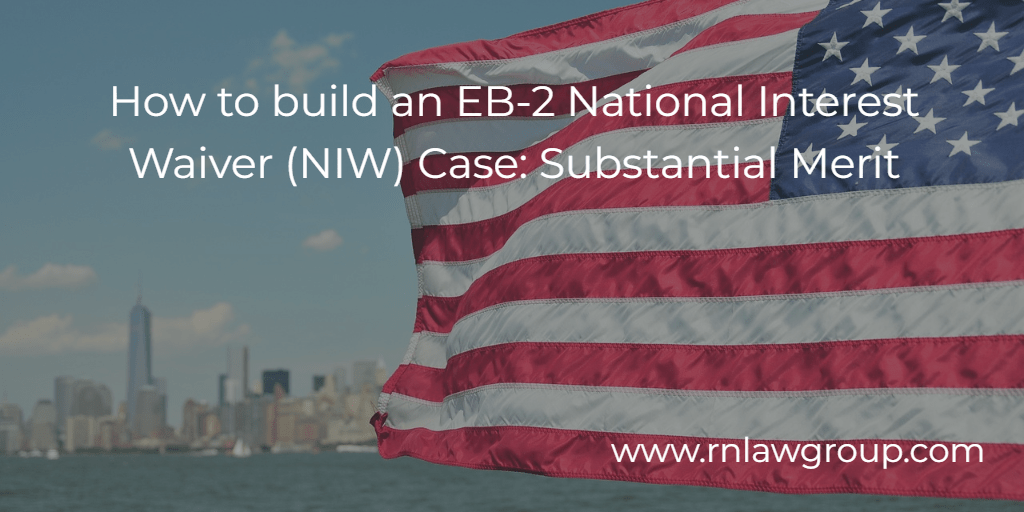
How to build an EB-2 National Interest Waiver (NIW) Case: Substantial Merit
When crafting an EB-2 NIW case, the singular most important aspect is properly defining your area of endeavor—i.e. in line with your background, what is it that your propose to do in the United States? This “proposed endeavor” is the foundation of your EB-2 NIW case and every argument made or piece of documentation provided should support the “proposed endeavor”.
In the past, USCIS focused on the proposed endeavor’s intrinsic merit to the United States, whether it would be contrary to the national interests to waive Labor Certification requirements, and whether the Alien was well-positioned to advance that work. This framework was rigid and overly restrictive, often requiring Aliens to prove that their work was unique or groundbreaking with direct, quantifiable impact on the national interest.
Through administrative policymaking and precedent bearing decisions, USCIS has developed a new framework of analysis for NIW cases—known as the Dhanasar stand. This standard is far more flexible than previous standards. Under the Dhanasar standard, the Alien must propose an endeavor of 1) substantial merit and 2) national importance and 3) be well positioned to advance that endeavor. USCIS will then inquire whether the impact or value of the job (i.e. proposed endeavor0 to be undertaken by the foreign candidate is so heavily in the national interest that it outweighs the interests of the Labor Certification (i.e. proving there are no qualified or available US workers).
When crafting a proposed endeavor, it is important to be strategic to narrowly focus that endeavor. Why might we do this? Our view is that it makes the argument of 1) national importance and 2) substantial merit that much easier to argue.
By loosening the formerly rigid standards for NIW approval, the post-Dhanasar USCIS allows flexibility for the Petitioner in self-defining and proving a number of key aspects of the case, namely the substantial merit section of any NIW petition. Look through every USCIS regulation, statute, or court case. You’ll recognize that there is no definition of substantial merit; the term “substantial merit” is not defined by the Act or regulations.
Therefore, in the absence of a statutory or regulatory definition, words should be interpreted according to their plain, ordinary, and literal meaning. Since Congress and/or USCIS have deliberately opted not to provide a definition for the term “substantial merit” in the relevant statute and/or regulations, the plain meaning of “substantial merit” serves as the default and official definition of that operative term.
As the Supreme Court has consistently reminded us, USCIS is bound by the language of its own regulations—be the language explicitly defined, or where not explicitly defined then by the plain meaning of those words. The Court has expanded this analysis to violations and contradictions of binding agency procedural policies. This doctrine is alive and well, as seen by a number of recent federal court decisions which invalidated USCIS decisions where the agency violated its own procedural policies. Thus, to refuse to apply the plain meaning of the term “substantial merit” is USCIS’ violation and/or failure to comply with its own intentions, regulations and policies. Doing so is a clear violation of law, subject to suit under the Administrative Procedures Act as well as a number of other procedural remedies.
When we build a case therefore, we must force USCIS to respect the term “substantial merit” and that that term shall only be understood or construed by the plain meaning of those words; to apply any other definition beyond the plain meaning of the operative statutory word(s) is arbitrary and capricious ripe for adjudication under the Administrative Procedures Act.
When we build these cases, we know that USCIS will not contest that a dictionary is the best place to find the plain meaning of near any word. As such, in applying the plain meaning of “substantial merit”, we will look to reputable dictionaries to provide the plain meaning of “substantial merit”.
As a quick example: Merriam-Webster dictionary defines “substantial” as “not imaginary or illusory” and “considerable”; Oxford dictionary defines “substantial” as “large in amount” or “considerable”. Merriam-Webster defines “merit” as “significance”; Oxford dictionary defines “merit” as “a quality of being good or deserving praise”.
Therefore, when we question whether the proposed endeavor is of substantial merit, USCIS shall consider: Is this this endeavor real and does it possess substantial praiseworthy quality?
For more information, or for a detailed conversation regarding eligibility for a National Interest Waiver petition, please schedule a time to speak here.
By: Ryan A. Wilck, Partner and Attorney at Law
Ryan Wilck is a Managing Partner and attorney at Reddy Neumann Brown PC with over a decade of US immigration law experience, enthusiastic and proactive in his approach assisting clients and their employees through the various phases of the permanent residency a/k/a Green Card process. “Concilio et labore” is not only the motto of Ryan’s favorite sports club but is also his life’s motto; all things come through wisdom and effort. Ryan is passionate about gaining the trust of his clients by utilizing a relentless and detail-oriented approach to understand their specific goals and concerns, hoping to instill a sense of confidence and stability. Whatever your immigration problem or interest, he and his team will find a solution, through wisdom and effort. Reddy Neumann Brown PC has been serving the business community for over 20 years and is Houston’s largest immigration law firm focused solely on employment-based business immigration. We work with employers and their employees, helping navigate the complex immigration process efficiently and cost-effective.
We are committed to assisting our clients with navigating the complex PERM Labor Certification (ETA 9089 and other challenging immigration matters as an accomplished immigration law firm in Houston, Texas. Our team is here to offer the direction and support you require, whether you’re a company trying to hire top talent or a foreign worker seeking to develop a career in the United States. To find out more about how we can help you with your immigration issues, get in touch with us right away.

